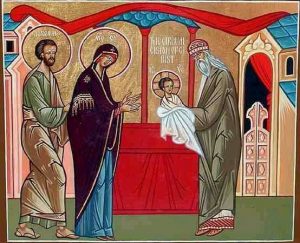 Today, the Byzantine Church keeps two feasts: the Circumcision of the Lord, the 8th day since Christmas (new calendar) and Saint Basil (see the blog post below).
Today, the Byzantine Church keeps two feasts: the Circumcision of the Lord, the 8th day since Christmas (new calendar) and Saint Basil (see the blog post below).
“I will keep my love for him always, with him my covenant will last” (Psalm 88:29)
Having taken the human nature in his birth, our Lord fulfills the covenant God made with his people by circumcision on the eighth day. The covenant between God and his people is therefore perfected by God himself becoming both God who initiates the covenant and man who submits to God’s will. This is confirmed in the second part of today’s Gospel: Jesus goes to the Temple to fulfill the will of the Father by his teaching. When Mary and Joseph find him, he fulfills the Law, “He went down with them and came to Nazareth and was subject to them. (Luke 2:51)”
Jesus taught, “Do not think that I came to destroy the Law or the prophets. I did not come to destroy but to fulfill. (Matthew 5:17)” St. Paul teaches that he restored the spirit of the Law, “for the letter kills, but the Spirit gives life. (2 Corinthians 3:6)”
For Christians, baptism replaces circumcision as the entry into the covenant. At baptism, we submit to the law of Christ: “Do you renounce Satan, and all his works, and all his angels and all his service, and all his pride?” “I do renounce him.” “Do you commit yourself to Christ?” “Yes, I commit myself to Him.”
By his death on the Cross, our Lord established a new covenant, and fulfills the will of the Father, “Not my will, but yours be done. (Luke 22:42)” He tells us to pray, “Our Father who art in heaven .. Thy will be done, on earth as it is in heaven.” The feast of Christmas and Circumcision celebrates the birth of the Lord according to the flesh and his birth among his people by circumcision. It foreshadows and sheds light on our birth according to the flesh and our rebirth in Christ in baptism.
Meditation by Archpriest David Petras